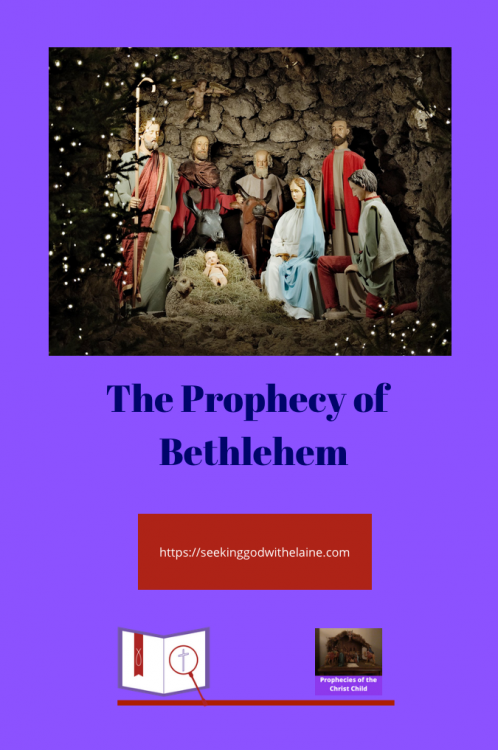God will tell us what He wants us to know. He wanted us to know where the Christ Child would be born. This daily devotional describes Bethlehem and why it was chosen for the Christ Child’s birthplace.
Nuggets
- It is understandable that God would tell us where the birth was going to take place.
- Scriptures tell us that the census took Mary and Joseph to Bethlehem, where Jesus was born.
Devotions in the Prophecy of the Christ Child series

God gave us prophecy about the Christ Child hundreds of years before the birth occurred. This prophecy was given with pinpoint accuracy.
Case in point. Prophecy said that the Christ Child would be born in a little town called Bethlehem. And He was!
Let's Put It into Context #1
The Holman Bible Dictionary defines prophecy as “reception and declaration of a word from the Lord through a direct prompting of the Holy Spirit and the human instrument thereof.”
Resource
Prophecy is a divine revelation to mankind through the Holy Spirit of a future event. This was God telling us that we would be delivered.
Let's Put It into Context #2
In today’s vernacular, we would probably say Bethlehem was a suburb of Jerusalem. It was five miles south-southwest of the capitol city. That put it in the territory given to the tribe of Judah.
The town has two names — Bethlehem Ephratah. Bethlehem means house of bread, and Ephratah means fruitfulness.
Resource
Bethlehem was a small town. In the first-century, it only had around 100 residents. Because of its size, it was unwalled. But since it was in the same mountain range as Jerusalem, it had some natural defenses.
The prophecy of the Messiah’s birth is not the first time we read of Bethlehem. It is the burial place of Jacob’s wife, Rachel. As that was where Naomi was from and went back to, Bethlehem was where the majority of the Book of Ruth occurred.
Most importantly, it was the birthplace of David. However insignificant the town was, it was forever equated with producing the King — the man after God’s own heart.
Would it not produce the next King?
Resource
Prophesied Down to the Town
“But you, Bethlehem Ephrathah, though you are small among the clans of Judah, out of you will come for me one who will be ruler over Israel, whose origins are from of old, from ancient times” (Mic. 5: 2 NIV)
God never leaves anything to chance. He has a plan right down the line.
We know God has the Plan of Salvation set even before He created the universe. “For he chose us in him, before the foundation of the world, to be holy and blameless in love before him” (Eph. 1: 4 CSB).
Glossary
It is understandable that God would tell us where the birth was going to take place. He told Micah that it would be in Bethlehem.
One reason I would say Bethlehem was chosen was because that is where David was born in 1085 BC.
Manton brought up an interesting point. Mary and Joseph were both descendants of King David. He reminded us that Joseph was a carpenter by trade. Who would have thought that a carpenter was a member of the royal family?
Resource
It wasn’t just that Joseph was a black sheep of the family. It was also that someone from somebody else’s family was on the throne. Herod was an Ascalonite.
But it wasn’t just Joseph who was down on his luck. It is the town as a whole. Aikman wrote, “For not only was Bethlehem little, but the exceeding low condition to which the family of the great king had sunk appears from the fact that Joseph and Mary, who could trace their pedigree up to David through a long line of kings, were thus poor, and received no sort of recognition in the crowded village.”
Resource
Jesus, as a baby, had no choice in the matter of where He was to be born. Kids don’t get the option. There are two hospitals in town where Adam could have been born. He didn’t get a vote on which one we picked.
Bethlehem didn’t get a vote, either. This wasn’t like the Olympics where they have a contest and make a splashy announcement.
God didn’t make a formal announcement, though. Or did He?
Where in Micah 5: 2 do we read the word Messiah? Nowhere. But then, God really didn’t want mankind trying to force fulfillment of the prophecy — or actively working to block it (like Herod did).
On the other hand, doesn’t it? Messiah means anointed one.
The Christ Child would be born for a purpose. That purpose was to be a ruler.
“… out of you will come for me one who will be ruler over Israel …” (Mic. 5: 2 NIV).
Rulers are anointed.
But God did put a caveat in there to distinguish the Messiah from all of the other baby boys and potential rulers born at that time. “… out of you will come for me one who will be ruler over Israel, whose origins are from of old, from ancient times” (Mic. 5: 2 NIV).
Do we need to look back at Ephesians 1: 4? Tie Ephesians 1: 4 and Micah 5: 2 up in a bow.
But isn’t that a difficult concept to understand? Unless we’ve lived it, it is difficult to comprehend 100 years. Since the beginning of time is beyond our understanding as is for eternity.
How Jesus Fulfilled the Prophesy
“Today in the city of David a Savior was born for you, who is the Messiah, the Lord” (Lk. 2: 11 CSB)
An article I read tried to discount that the Christ Child was born in Bethlehem. The articles didn’t try to say that Mary and Joseph weren’t His parents.
Apparently, some current scholars feel that a census impacting the entire empire (Lk. 2: 1-4) would not have happened. So, there would have been no reason for Mary and Joseph to leave Nazareth. So, basically, they accuse Matthew and Luke of lying about Jesus’ birth. Also, since Mark and Paul didn’t address Jesus being born in Bethlehem, he wasn’t.
I am just shaking my head. No book can ever address everything. Remember what John wrote? “And there are also many other things that Jesus did, which, if every one of them were written down, I suppose not even the world itself could contain the books that would be written” (Jn. 21: 25 CSB).
John limited that statement to things Jesus did. He did not even get into things about Him. (And remember, John does not give us an account of the birth of Jesus, either.)
It seems strange to me that an empire-wide census seems implausible. Oh, you are only going to tax some of the people? You are never going to have tax code changes impacting everyone?
What kind of politicians were they?
Farrar shed a little light in this. He stated that an empire-wide census had been decreed earlier, which had been completed.
The problem was with the Jews. Their culture wouldn’t let the census be completed as was in the rest of the Roman Empire. Normally, the census would be taken at the person’s residence. (It sounds like how we do it today.)
The Jews are the ones who insisted that they must return to the town where their family originally lived. Their genealogies and the Twelve Tribes were important to them.
Resource
It sounds like 99% of the empire wouldn’t have had much of a problem with the census. Only the Jews would have had to take extra measures — brought upon by themselves.
Scriptures tell us that the census took Mary and Joseph to Bethlehem. While they were there, Jesus was born.
To me, it comes down to what are you going to believe? Are you going to believe a book written by a scientist? By a scholar? By the Creator of the universe?
Something sounds implausible? “For with God nothing will be impossible” (Lk. 1: 37 KJV).
God wants us to believe by faith, not through understanding. Faith is the conviction that the doctrines revealed in God’s Word are true, even if we do not understand all aspects of them, a belief which impacts our lives.
That is how we submit to God. We allow Him to control everything.

Making the Connections
The Christ Child’s coming is all about God. It is about getting all of mankind back to worshiping Him.
Aikman put it this way. He wrote, “The birth of Christ was an event whose relations were chiefly Godward. Christ’s coming to the earth is inconceivably the greatest of all events to us; but, after all, God the Father, and the eternal glory of the Godhead, are concerned in it in a way we cannot now fully understand, but of which the Scriptures give us distinct intimations.”
Resource
Yes, the Christ Child came to establish salvation for us. But it isn’t about us. It is about God.
It is about why God created us in the first place — to worship Him.
Let’s look at it this way. David was the king. But in Isaiah 11: 1, it says, “Then a shoot will grow from the stump of Jesse, and a branch from his roots will bear fruit” (CSB).
It doesn’t talk about the king. It talks about his father, who was a commoner.
It isn’t about the Christ Child. It is about His Father.

How Do We Apply This?
What the Sovereign God did was to design a plan so that our relationships could be restored to Him. He did it for Him, and He did it for us.
We have to let go of our desire to be in control of everything — to know everything. We can’t focus on us.
We have to focus on God. We do that first by ABCing. Then, we get around to the D part.
The ABCDs of Salvation
If you have not become a believer in Christ, please read through the
Plan of Salvation and prayerfully consider what God is asking you to do.
A – admit our sins
B – believe His Son Jesus is our Redeemer
C – confess God as Sovereign Lord
D – demonstrate that commitment by making any changes needed in our lives to
live the way in which God has called us
The Disciple’s Job Description
Yes, we will have fits and starts when we navigate the Sanctification Road. We have to remain firm in Who we believe in, ask forgiveness, and continue in the sanctification process.
When this life is over and this Heaven and earth are no more, we will live for eternity with the Father and the Son.
Father God. You tell us point blank what You want. You wanted the Christ Child born in Bethlehem – You accomplished that. You want us to be obedient to You. Lord, we pray for strength to follow Your laws and commandments. Thank You for telling us what to expect to prepare us and to know that we can put our trust in You. Amen.
What do you think?
Leave me a comment below (about this or anything else) or head over to my Facebook group for some interactive discussion.
If you don’t understand something and would like further clarification, please contact me.
If you have not signed up for the email daily or weekly providing the link to the devotions and the newsletter, do so below.
If God has used this devotion to speak with you, consider sharing it on social media.
Pingback: The Christ Child Is Born – Seeking God with Elaine